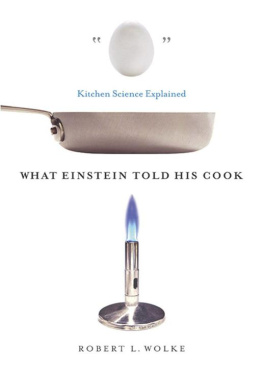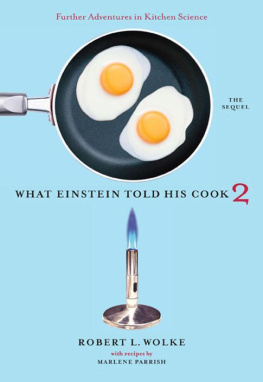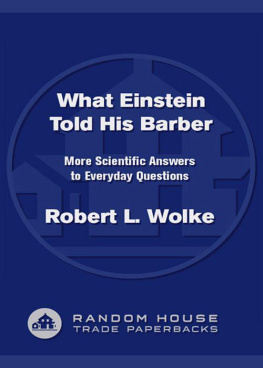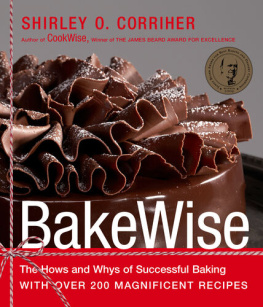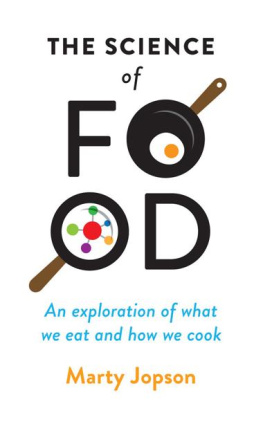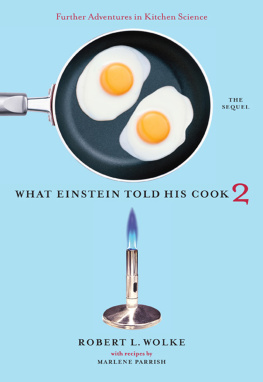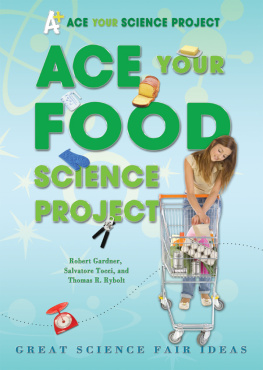More praise for
What Einstein Told His Cook
I have enjoyed Bob Wolkes column in the Post for years, and his book is as good a read on the science of cooking as there is. Bob is not only well educated, he is a wit and a wonderful, gifted writer who can make anyone understand whats behind the magic that happens in the kitchen. His sound, clever recipes are a welcome bonus.
Mark Bittman, author of How to Cook Everything
The best book on food (not a cookbook) of 2002. Robert Wolkes book is so full of useful information that youll find yourself referring to it again and again. Not only does he have the penetrating mind of a chemistry professor, but Robert Wolke also has a tremendous sense of humor. Besides being packed with all kinds of interesting food science tidbits, this book is just plain funny.
SauteWednesday.com
Robert Wolkes terrific book will be invaluable and accessible to every cook. The style is clear, the text is honest, and perhaps best of all the book is fun to read, filled with the whys and hows of the kitchen.
Paula Wolfert, author of Mediterranean Cooking and Mediterranean Grains and Greens
The occasional recipe adds diversity but facts are the books strong point. What Einstein Told His Cook is a scientifically accurate but witty and entertaining study of the chemistry of food and cooking.
Elliot Ketley, Restaurant (UK)
This book should be on the shelf of any serious cooks library. By demystifying the fundamentals of the kitchen, it empowers the cook to navigate recipes with confidence and control.
Lidia Matticchio Bastianich, author of Lidias Italian-American Kitchen and Lidias Italian Table
Wolke [is] a chemist with a preternatural ability to explain complex chemical reactions in simple terms. Whatever the magnitude of the topic, Wolke addresses it with the same understated intelligence and paternal humor.
Tim Carman, Washington City Paper
If you read Bob Wolkes What Einstein Told His Cook , you may have to kick some old wives tales right out of the kitchen. One of the books joys is that some quirks of the kitchen may never have occurred to us. Thats what makes Bob Wolke the science teacher we wished we had when we were stuck with Big Bad Science Snob. Hes not afraid to lunge at a joke to explain a concept when Big Bad would have bored us silly with irrelevant detail.
Suzanne Martinson, Pittsburgh Post-Gazette
Robert L. Wolkes recipes are lab experiments you can eat. Thats what makes reading What Einstein Told His Cook so much fun for the avid home chef who derives as much pleasure from understanding food as eating it.
New York City Record
For the kitchen nerd with a sense of humor. An absorbing read.
Food & Wine (Ireland)
Good science only adds to the enjoyment of the culinary arts. With a sauce of wit and panache, Wolke serves up commonsense answers to every question that a curious cook could ask.
Roald Hoffman, 1981 Nobel Laureate in Chemistry
ALSO BY ROBERT L. WOLKE
TEXTBOOKS
Impact: Science on Society
Chemistry Explained
TRADE BOOKS
What Einstein Didnt Know:
Scientific Answers to Everyday Questions
What Einstein Told His Barber:
More Scientific Answers to Everyday Questions
What Einstein Told His Cook 2:
The Sequel; Further Adventures in Kitchen Science
What Einstein Told His Cook
Kitchen Science Explained
ROBERT L. WOLKE
with recipes by Marlene Parrish
W. W. NORTON & COMPANY
New York London
Copyright 2002 by Robert L. Wolke
Copyright 2002 by Marlene Parrish
All rights reserved
First published as a Norton 2008
Recipe for Chocolate Velvet Mousse adapted from Chocolate Mousse with Olive Oil, published in The Best American Recipes 2000 , Houghton Mifflin, 2000. Adaptation printed by permission of Teresa Barrenechea. Recipe for Champagne Jelly in The Best American Recipes 1999 , Houghton Mifflin, 1999. Recipe copyright 1998 by Lindsey Shere. Reprinted by permission of Lindsey Shere.
For information about permission to reproduce selections from this book, write to Permissions, W. W. Norton & Company, Inc., 500 Fifth Avenue, New York, NY 10110
Illustrations by Alan Witschonke
Library of Congress Cataloging-in-Publication Data
Wolke, Robert L.
What Einstein told his cook: kitchen science explained / Robert L. Wolke; with recipes by Marlene Parrish.1st ed.
p. cm.
Includes bibliographical references.
ISBN: 978-0-393-33987-1
1. Cookery. 2. ScienceMiscellanea. I. Parrish, Marlene. II. Title.
TX652.W643 2002
641.5dc21 2002001708
W. W. Norton & Company, Inc., 500 Fifth Avenue, New York, N.Y. 10110
www.wwnorton.com
W. W. Norton & Company Ltd., Castle House, 75/76 Wells Street, London W1T 3QT
This book is dedicated to my wife, partner,
colleague, and motivator, Marlene Parrish.
CONTENTS
What is raw sugar? Is refined white sugar unhealthful? How can you soften hardened brown sugar? What are treacle, sorghum, and sulphured molasses? Whats the difference between cane sugar and beet sugar? How do you dissolve two cups of sugar in one cup of water? What does caramelize mean? How are starches and sugars related? How do they get corn syrup from corn? What is Dutch process cocoa? Why does chocolate melt in the mouth? How do they make white chocolate?and more.
What are all those special salts and tenderizers in the supermarket? What are salt substitutes? Why do we add salt to the water for boiling pasta? Whats so special about sea salt? Kosher salt? Freshly ground salt? Can a potato remove the excess salt from over-salted soup? Why do recipes tell you to use unsalted butter and then add salt?and more.
Whats the difference between a fat and a fatty acid? Why are oils only partially hydrogenated? Why do we clarify butter? How do they make corn oil? How do the various cooking oils compare? What can you do with used cooking oil? How do nonstick cooking sprays work? What noodles contain fat? Is heavy cream really lighter than light cream?and more.
What do home water filters do? Whats the difference between baking powder and baking soda? Is aluminum dangerous? What is baking ammonia? Sour salt? Cream of tartar? Artificial vanilla? MSG? Why is there no calcium in cream cheese? Why does lasagne dissolve metal? How is vinegar made? Are green potatoes poisonous? How is lye used in our foods?and more.
Is a rare steak bloody? What makes ground beef brown? Is prime rib prime beef? Why is the meat near the bone sweetest? What do bones contribute to a stock? Whats the best way to skim fat from a stock? How do they make all those different hams? How does brining work? How long is overnight? What makes gravy lumpy and greasy? Why does fish cook so quickly? Why does fish smell fishy? What is surimi? Are oysters on the half-shell alive? Should lobsters be boiled or steamed?and more.
What is a calorie? How is cooking different at high altitudes? Why does water boil? Why does it take so long to reduce a stock? What do the Btu ratings of ranges mean? Does the alcohol boil off when you cook with wine? Can you really fry an egg on the sidewalk? Is charcoal or gas better for grilling? Whats the best way to defrost foods? Why do bakers roll out their dough on marble? Can hot water freeze faster than cold water? Can eggs be frozen? What is freezer burn? Why does blowing on hot food cool it?and more.
Is coffee acid? Does espresso contain more caffeine than American coffee? How is coffee decaffeinated? Whats the difference between a tea and a tisane? What makes soft drinks so acidic? Does belching contribute to global warming? Can soda go flat in an unopened bottle? How can you open a bottle of Champagne with aplomb? Why do some wines have plastic corks? What do you do with the wine cork when the waiter gives it to you? How much alcohol is there in various beverages?and more.

